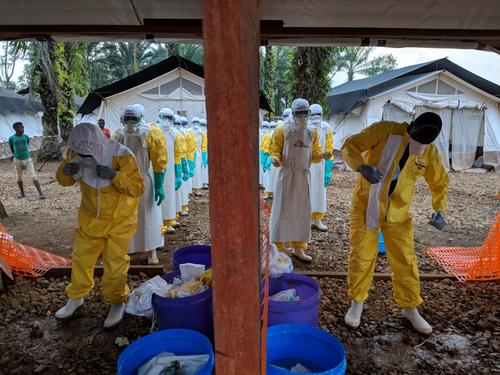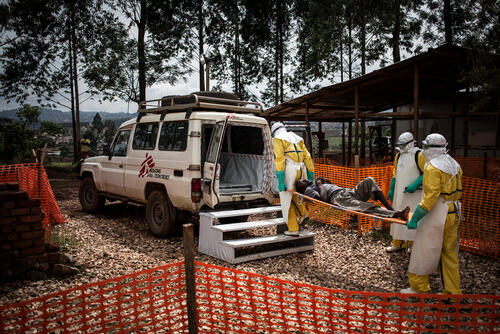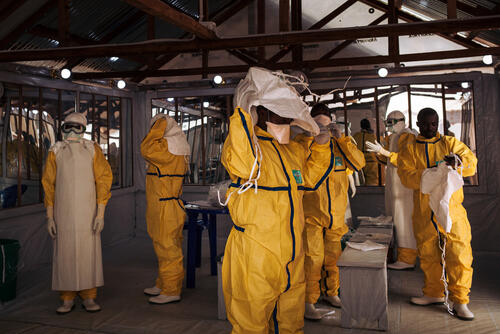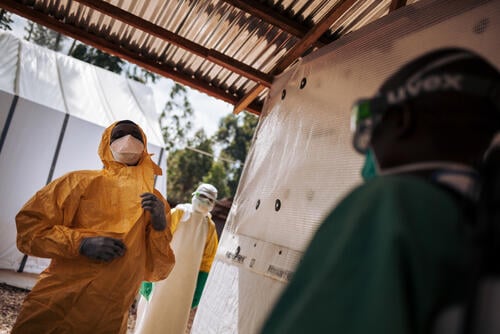Médecins Sans Frontières (MSF) has treated 65 patients confirmed to be diagnosed with Ebola in the first month of intervention in the latest Ebola outbreak, in North Kivu, Democratic Republic of Congo (DRC). This number is more than 80 percentSixty-five confirmed patients were admitted to the Mangina Ebola Treatment Centre, in addition to the 16 treated in the Ebola Treatment Centre in Beni by 3 September, one month after MSF began caring for Ebola patients in Nord Kivu. The other 10 confirmed cases listed by the Ministry of Health at that time died in the community and tested positive after death and were therefore never admitted to an Ebola Treatment Centre. of the total number of confirmed patients hospitalised in Ebola Treatment Centres so far during this epidemic. Of the patients confirmed Ebola positive in Mangina Ebola Treatment Centre, 29 have recovered and returned to their families. Three patients remain under treatment.
“We are at a crucial point in the epidemic. Yes, the number of patients in the treatment centre has reduced significantly but new cases from a number of different chains have emerged in recent days”, said Berangère Guais, MSF’s Emergency Coordinator in Beni. “We must continue to work with the community to build trust and ensure that everyone presenting with symptoms of Ebola is isolated and tested quickly. We just cannot let our guard down until the epidemic is declared over.”
Rapid response to epidemic
MSF teams working in a hospital in Lubero arrived in Mangina on the eve of the declaration of the Ebola outbreak on 1 August. The epidemic in Mangina, the epicentre of the outbreak, is the first in DRC’s North Kivu province. Our teams immediately began mounting a response against the virus alongside the Congolese Ministry of Health. In the days that followed, experienced MSF staff arrived from across DRC and around the world to help train local staff, and work with them side by side in order to care for the sick and prevent the outbreak from spreading.
“We knew we had to act fast. When we arrived, we saw that the local health centre in Mangina was overwhelmed”, said Patient Kamavu, an experienced nurse from MSF’s Congo Emergency Pool, who arrived on site on 3 August. “A number of health staff were ill and the number of patients was increasing each day. They were doing their best but everyone was crowded together in one ward of the hospital. We had to work quickly to improve the situation for both the patients and the staff.”
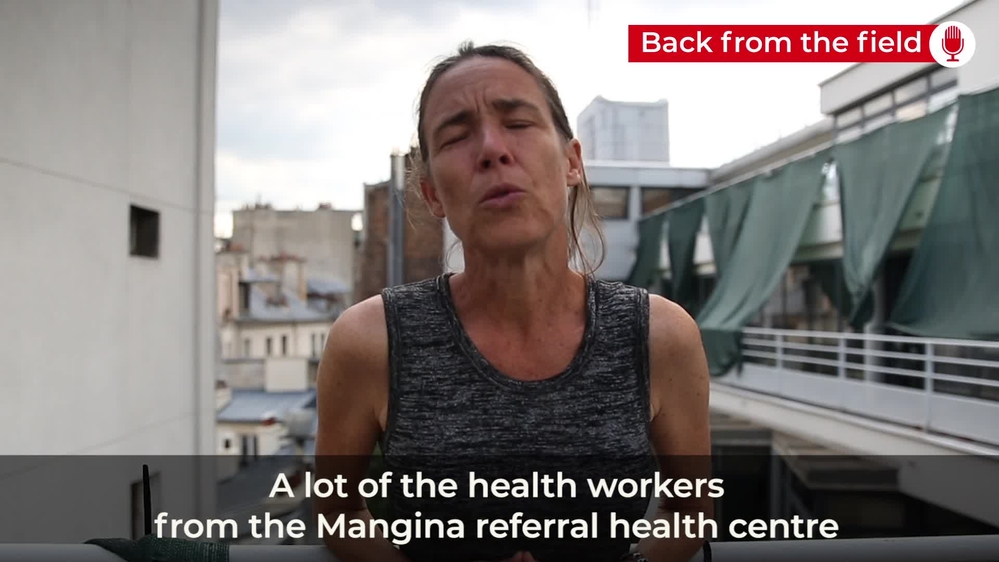
BACK FROM THE FIELD: Karin Huster - Ebola, North Kivu DRC (ENG)
Building new infrastructure to cope
By 6 August MSF had improved the safety of the isolation unit for suspected and confirmed patients in a ward of the Mangina Health Centre. Teams constructed another isolation unit inside the Hospital General de Reference in Beni and had begun constructing a treatment centre in Mangina. The Mangina Ebola Treatment Centre, with a capacity to care for 68 patients (which can expand to 74 beds if needed), opened on 14 August. Thirty-seven patients were transferred from the Mangina isolation ward to the Ebola Treatment Centre that day. The Beni isolation ward was completed and handed over to the Ministry of Health who assigned its management to another NGO.
“We focused on patient care whilst our logistics and water and sanitation teams worked day and night to complete a treatment centre that could care for patients in a safe way”, continued Patient. “It was incredible, we’d make visits to the site just one day later and see a totally different hospital appearing.”
MSF also constructed and opened a seven-bed transit centre in Makeke (on the border of Nord Kivu and Ituri provinces) on 28 August. The transit centre was built in response to a number of cases in the area and because of community resistance to being transferred to Mangina, and is a temporary measure while another organisation builds an Ebola Treatment Centre. Now, suspect patients can be isolated and tested for the Ebola virus close to their homes and will only be transferred by road to one of the treatment centres if they test positive.
We are at a crucial point in the epidemic… new cases from a number of different chains have emerged in recent daysBerangère Guais, MSF’s Emergency Coordinator in Beni
New treatments being used
During the course of this epidemic MSF has also been able to offer new treatments to patients with confirmed Ebola infection under a compassionate use protocol. These treatments are given only with the informed consent of the patient (or a family member if they are too young or too sick to consent) and are provided in addition to the supportive care (hydration and treatment for the symptoms of Ebola like diarrhoea and vomiting) that MSF offers to all Ebola patients.
“It’s a great relief to finally be able to offer patients more than supportive care. Statistically, Ebola patients have had less than a 50 percent chance of survival. This is devastating and terrifying to families and the community,” says Patient.
Providing additional support
Outside of Ebola Treatment Centres, MSF teams working in the Beni and Mangina areas, as well as in Ituri province, between Mambasa and Makeke (on the border with North Kivu), are visiting health centres and training staff on the proper triage of Ebola suspect cases. We are also donating crucial protection material, as well as setting up isolation areas where patients suspected of carrying the virus can be safely cared for while an ambulance arrives. Health centres in Mangina and Beni that have seen positive cases are also being decontaminated.
“Sadly, in this epidemic we have seen at least 17 health workers infected with Ebola”, says Berangère Guais. “Health staff caring for patients with illnesses like malaria and pneumonia, or assisting women to give birth, must be protected by a proper triage system which identifies and isolates suspect Ebola patients before they enter a hospital. This will not only protect health workers but also their patients and will prevent health centres amplifying the spread of the virus.”
MSF has recently received approval to commence a vaccination campaign for frontline workers on the axis between Makeke and Biakato.
The MEURI protocol allows new drugs that are not yet registered to be offered to patients affected by outbreaks of deadly diseases like Ebola in order to give them a better chance of survival. Five drugs Favipiravir, Remdesivir (GS5734), REGN3470-3471-3479, ZMapp and mAb114 are currently available in the Democratic Republic of Congo. The decision on which drug is best for which patient is taken by a team of treating clinicians from MSF, WHO, INRB and the Congolese Ministry of Health.



